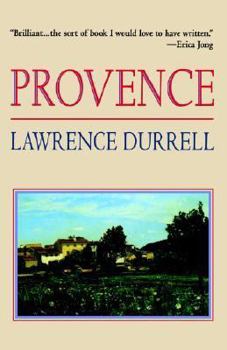Provence
Select Format
Select Condition 
Book Overview
Lawrence Durrell, who was called "one of the [twentieth] century's great literary pyrotechnicians" (Kenneth McLeish, London Times ), was also one of its most accomplished travel writers. Durrell lived... This description may be from another edition of this product.
Format:Paperback
Language:English
ISBN:1559702478
ISBN13:9781559702478
Release Date:May 1994
Publisher:Arcade Publishing
Length:200 Pages
Weight:0.60 lbs.
Dimensions:0.6" x 5.5" x 8.3"
Related Subjects
Americas Biographies England Ethnic & National Europe France General History Ireland IrishCustomer Reviews
3 ratings
entertaining, not a textbook perspective
Published by Thriftbooks.com User , 17 years ago
Durrell's long experience in the region allowed him to discuss many of the more obscure aspects of Provence and its history. It is part history, part memoir, part poetry. The book should be read for its value as entertainment and to gain a sense of Provence & its history, but I do not feel that it would be a suitable source of accurate historical information. Upon furhter investigation of many events that Durrell talks about, I discovered that he presented only one side of a situation about which there is no current consensus or agreement among academics/historians. Finally, I found the last chapter of the book quite bizarre, and admit that I got very little out of it. Citing the above qualifications, I recommend this book for those interested in Provence (with the added bonus that Durrell's writing is a thing enjoyable in itself).
Durrell's Swan Song
Published by Thriftbooks.com User , 23 years ago
Lawrence Durrell did "go gently into that good night," and this book serves as a document to that peaceful passage. Like his novels, this book is a mixture of the poetic, the prosaic and especially the erotic motifs that preoccupied him throughout his literary career. Like Mayles after him, Durrell had a deep afffection for the region and for the Provenceaux. Both Mayles and Durrell are great guides to take along on either a literal or imaginary excursion through the region. Mayles is the more humorous of the two and will keep you constantly entertained. Durrell will give you a clearer understanding of the Provencal history, telling you who built monuments such as the Pont du Gard and something about their effect on a visitor: "Yet there are surprises for us even here, for even a functional artefact like the Pont du Gard is so huge in conception that its magniloquence is the equal of Westminster Abbey. But we must remember that it was dedicated to water and water was a God. The best description of the Pont is by Rousseau. It took a great deal to shut a man like him up, but the emeregence of this mastadon from the featureless garrigues which house the spring that feeds it deprived him of coherent speech, so uncanny did it seem." This is an example of what distinguishes Durrell's book. He will take you to an oft-visited site and in a few strokes, with the occasional literary allusion thrown in for good measure, produce a vivid enough image that even before you travel to the site you will have a pretty good notion of what to expect. The only part of the book I found distracting was the uneven quality of the poems that Durrell inserts throughout the narrative. Sometimes they work seamlessly, at other times they obtrude and sound more like literary exercises than spontaneous outbursts. In other words, imagine your tour guide sometimes breaking into melifluous song and other times whistling out of tune. If you really want to know something about the history of the region, from an informed visitor (it was his home base for his last thirty years), by all means put this book on your list. If you want a more congenial look at the region and its highly colorful inhabitants, stick to Mayle.
Roman excursion...
Published by Thriftbooks.com User , 23 years ago
I read "Provence" by Lawrence Durrell before I stumbled onto more recent works by other authors. For my money, this is the book for arm chair and real travelers, and history buffs who are interested in Provence. Durrell lived there for over 30 years and his writing depicts a place he found filled with the spirits of past civilizations. His chapters cover a number of them, including the Greeks, Romans, and Medieval times. The chapter I have remembered the longest is "The Story of Marius." Gaius Marius was one of the greatest generals Rome ever produced. He was married to Julius Caesar's aunt, and was responsible for "saving" Rome from northern invaders driven from their own homes by flood and famine. Marius' successor Sulla, tried to destroy his reputation by erasing many of his monuments, but Julius Caesar restored them when he came to power. Durrell takes you to visit a site in ancient Les Baux marked for an unknown event in Marius' life. Durrell says, "There is much else we might like to know about Marius which would bring him more fully to life in these pages, but history is never eloquent enough about her children.." (Coleen McCullogh writes great fiction about these times, see "The First Man in Rome.")In spite of it's Roman past, Durrell finds Provence more Medieval than anything else. He says "Provence is a strange place..with withdrawn Protestant communities who live out a life of secret repudiation." He suggests a certain melancholy, a "deep introspective undertow" permeates the land. Narbonne, Avignon, and Nimes are rich with Roman relics. Here one can see the Roman tombs with "funery stone of freedman's caps." When the noble Roman died, he freed some of his slaves to make himself eligible for the Afterworld. The cap symbolizing this freedom has come down through history in many forms including Robin Hood's peaked hat and in the various artistic renderings of Miss Liberty's head gear. The city of Marseilles is in Provence--from whence during the French Revolution came the serfs wearing the 'freedom' caps.





